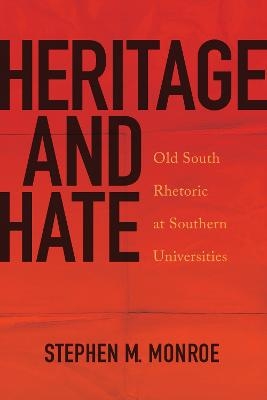
Heritage and Hate
Old South Rhetoric at Southern Universities
Seiten
2021
The University of Alabama Press (Verlag)
978-0-8173-2093-5 (ISBN)
The University of Alabama Press (Verlag)
978-0-8173-2093-5 (ISBN)
Presents the US South as a pulsating rhetorical landscape, a place where words and symbols rooted in a deeply problematic past litter the ground and contaminate the soil. This provocative text focuses on predominantly white southern universities where Old South rhetoric still reverberates.
How southern universities presently contend with an inherited panoply of words and symbols that embody and perpetuate Old South traditions
In Heritage and Hate: Old South Rhetoric at Southern Universities, Stephen M. Monroe presents the US South as a pulsating rhetorical landscape, a place where words and symbols rooted in a deeply problematic past litter the ground and contaminate the soil. This provocative text focuses on predominantly white southern universities where Old South rhetoric still reverberates, empowering rebel flags to stifle racial harmony, school cheers to reinforce racial barriers, and student yearbooks to create and protect an oppressive culture of exclusion. Across the region, in college towns like Oxford, Mississippi, Athens, Georgia, and Tuscaloosa, Alabama, communities remain locked in a difficult, recursive, and inherently rhetorical struggle wrestling with this troubling legacy.
Words, images, and symbols are not merely passive artifacts of southern history, Monroe argues, but formative agents that influence human behavior and shape historical events. Drawing on research from many disciplines, including rhetoric, southern studies, history, sociology, and African American studies, Monroe develops the concept of confederate rhetoric: the collection of Old South words and symbols that have been and remain central to the identity conflicts of the South. He charts examples of such rhetoric at work in southern universities from Reconstruction to the present day.
Tracing the long life and legacy of Old South words and symbols at southern universities, this book provides close and nuanced analysis of the rhetorical conflicts that have resulted at places like the University of Mississippi and the University of Missouri. Some conflicts erupted during the civil rights movement, when the first African American students pushed their way into all-white southern universities and colleges, and others are brewing now, as African Americans (and their progressive white peers) begin to cement genuine agency and voice in these communities. Tensions have been, and remain, high. Remnants of the old majority continue to recruit modern adherents. The white majority may be in decline by many measures, but it is also powerful and resilient, still standing guard in defense of Old South traditions.
Ultimately, Monroe offers hope and optimism, contending that if words and symbols can be used to damage and divide, then words and symbols can also be used to heal and unify. Racist rhetoric can be replaced by antiracist rhetoric. The old South can become new. While resisting naÏve or facile arguments, Heritage and Hate ultimately finds the promise of progress within the tremendous power of language.
How southern universities presently contend with an inherited panoply of words and symbols that embody and perpetuate Old South traditions
In Heritage and Hate: Old South Rhetoric at Southern Universities, Stephen M. Monroe presents the US South as a pulsating rhetorical landscape, a place where words and symbols rooted in a deeply problematic past litter the ground and contaminate the soil. This provocative text focuses on predominantly white southern universities where Old South rhetoric still reverberates, empowering rebel flags to stifle racial harmony, school cheers to reinforce racial barriers, and student yearbooks to create and protect an oppressive culture of exclusion. Across the region, in college towns like Oxford, Mississippi, Athens, Georgia, and Tuscaloosa, Alabama, communities remain locked in a difficult, recursive, and inherently rhetorical struggle wrestling with this troubling legacy.
Words, images, and symbols are not merely passive artifacts of southern history, Monroe argues, but formative agents that influence human behavior and shape historical events. Drawing on research from many disciplines, including rhetoric, southern studies, history, sociology, and African American studies, Monroe develops the concept of confederate rhetoric: the collection of Old South words and symbols that have been and remain central to the identity conflicts of the South. He charts examples of such rhetoric at work in southern universities from Reconstruction to the present day.
Tracing the long life and legacy of Old South words and symbols at southern universities, this book provides close and nuanced analysis of the rhetorical conflicts that have resulted at places like the University of Mississippi and the University of Missouri. Some conflicts erupted during the civil rights movement, when the first African American students pushed their way into all-white southern universities and colleges, and others are brewing now, as African Americans (and their progressive white peers) begin to cement genuine agency and voice in these communities. Tensions have been, and remain, high. Remnants of the old majority continue to recruit modern adherents. The white majority may be in decline by many measures, but it is also powerful and resilient, still standing guard in defense of Old South traditions.
Ultimately, Monroe offers hope and optimism, contending that if words and symbols can be used to damage and divide, then words and symbols can also be used to heal and unify. Racist rhetoric can be replaced by antiracist rhetoric. The old South can become new. While resisting naÏve or facile arguments, Heritage and Hate ultimately finds the promise of progress within the tremendous power of language.
Stephen M. Monroe is chair and assistant professor in the Department of Writing and Rhetoric at the University of Mississippi.
List of Figures
Preface
Acknowledgments
Introduction
Chapter 1. "A Name So Beautiful and Appropriate": "Ole Miss" and the Ideology of Self-Identification from 1897 to 1971
Chapter 2. What Is a Hotty Toddy? From School Cheer to Racist Jeer
Chapter 3. Minimization at Mizzou: Confederate Rhetoric and Interpretative Difference
Chapter 4. Obfuscation at the University of Mississippi
Chapter 5. Football, Flags, and Rhetorical Fury
Chapter 6. Origins and Repercussions: The Continuum of Confederate Rhetoric
Chapter 7. Reasons for Hope? Scholars of Language and a New South Rhetoric
Epilogue
Postscript
Notes
Bibliography
Index
| Erscheinungsdatum | 24.06.2021 |
|---|---|
| Reihe/Serie | Rhetoric Culture and Social Critique |
| Zusatzinfo | 22 black & white figures |
| Verlagsort | Alabama |
| Sprache | englisch |
| Maße | 152 x 229 mm |
| Gewicht | 575 g |
| Themenwelt | Geisteswissenschaften ► Geschichte ► Allgemeine Geschichte |
| Geisteswissenschaften ► Geschichte ► Regional- / Ländergeschichte | |
| Sozialwissenschaften ► Pädagogik ► Bildungstheorie | |
| Sozialwissenschaften ► Pädagogik ► Erwachsenenbildung | |
| Sozialwissenschaften ► Soziologie | |
| ISBN-10 | 0-8173-2093-8 / 0817320938 |
| ISBN-13 | 978-0-8173-2093-5 / 9780817320935 |
| Zustand | Neuware |
| Haben Sie eine Frage zum Produkt? |
Mehr entdecken
aus dem Bereich
aus dem Bereich
eine Familiengeschichte der Menschheit
Buch | Hardcover (2023)
Klett-Cotta (Verlag)
49,00 €
Eine wahre Geschichte von Schiffbruch, Mord und Meuterei
Buch | Hardcover (2024)
C.Bertelsmann (Verlag)
25,00 €


